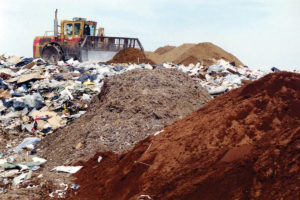A complete ban on all interstate trade in trash would force households and firms in exporting states to seek higher-cost disposal sites, and would impose losses on landfill operators in importing states, who would see significant declines in their business. Overall, the economic losses would total some $3.8 billion.
Interstate trade in trash, which has tripled over the past decade, has been the subject of repeated assaults by states seeking to halt garbage imports. All of these have failed at the hands of the Supreme Court, which has ruled state interference with trade in trash to be as unconstitutional as other state attempts to restrict interstate trade. Yet the Court has acknowledged that Congress’ power to regulate interstate commerce extends to rubbish. Thus, since 1995 various congressional proposals to restrict the trash trade have been floated.
Because forty-seven states now ship some of their garbage to other states and forty-five of them import the stuff, the issue is nationwide. Recent research reveals what such restrictions would cost us (Ley, Macauley, and Salant 2002). The bottom line obviously depends on the extent of the trade restrictions, but Ley et al. demonstrate that complete prohibition would lower our collective wealth by nearly $4 billion. In some areas of the country, where trash is a particularly important import or export, the per capita losses could exceed $350.
Interstate movement of municipal solid waste (MSW) amounts to nearly 10 percent of the MSW produced every year in the United States. The extent of this trade is driven by a combination of widely varying disposal costs and inexpensive transportation. Due to differences in land values and local regulations, average tipping (disposal) fees at landfills range from around $10 per ton in Nevada to $80 per ton in New Jersey. Moreover, it costs only 10-15 cents per ton-mile to move solid waste around the country. Thus, for example, trucking twenty tons of trash from Trenton to Pittsburgh would save the shipper $1,000 in tipping fees at a cost of $400 in trucking charges, yielding a profit of $600.
Given numbers such as these, it is little surprise that eight states, headed by New York and New Jersey, export more than one million tons of trash each year, or that eight other states, led by Pennsylvania, each import comparable amounts. Even Montana gets in the game, importing trash from South Dakota, Wyoming, and Idaho, and returning the favor to South Dakota.
The most cogent objection to the interstate trade in trash is that landfills allegedly harm citizens living near landfills, costs that are not taken into account by those who dump. (The same claim could, of course, be made about trash produced by one’s neighbors.) Yet even the Environmental Protection Agency acknowledges that the potential threat to air and water quality posed by modern landfills is essentially nonexistent.
Still, disrupting trade in trash would benefit households in importing states by depressing tipping fees there, as out-of-state dumpers exited the local market. It would also satisfy the inclinations of those who believe—rightly or wrongly—that imported trash is a threat to their health and well-being. Thus, the possibility of restricting interstate trade in trash remains on the congressional agenda.
The possibilities under consideration run the gamut. At the low end, Congress would simply empower states to levy a tax of up to $1 a ton on imported trash. Such a minuscule fee would have little impact on the magnitude of the trash trade, thus resulting in only about $10 million in economic losses.
At the other extreme, some proposals have called for a complete ban on interstate trade in trash. This would force households and firms in exporting states to seek higher-cost sites at which to dispose of their trash. It would also impose losses on landfill operators in importing states, whose business would decline. Of course landfill operators in states that currently export rubbish would benefit from a rise in local business, but these gains would be swamped by consumers’ losses. Overall, the economic losses of banning interstate trade in trash would total some $3.8 billion, with a singularly uneven burden. Illinois residents, predominantly Chicagoans, would lose an average of but 17 cents apiece (because the landfills in rural Illinois are good substitutes for those in southern Wisconsin). In contrast, western Pennsylvanians would average some $370 per person in damages (because landfill operators would lose trash from New Jersey). Between these extremes, New York City residents would suffer losses of $93 apiece due to higher disposal fees.
Clearly, the size of these losses is modest in the context of the enormous American economy. Yet the estimates highlight a recurring feature of much extant and proposed federal environmental legislation. Restricting free interstate trade in trash will result in clear and demonstrable costs, leading to unequivocal reductions in our welfare. These will come in supposed anticipation of environmental benefits that—to date—can at best be said to be speculative.
REFERENCE
Ley, Eduardo, Molly K. Macauley, and Stephen W. Salant. 2002. Spatially and Intertemporally Efficient Waste Management: The Costs of Interstate Trade Restrictions. Journal of Environmental Economics and Management 43: 188–218.
Daniel K. Benjamin is a PERC Senior Associate and Professor of Economics at Clemson University. “Tangents” investigates policy implications of recent academic research.




